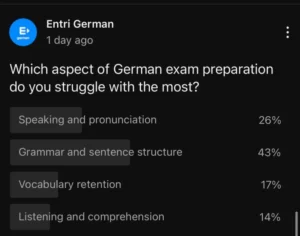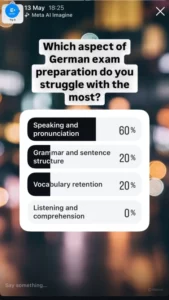Table of Contents
You know that shattering sensation when you learn some German vocab one day only to forget it the next day? Well, you are not alone, mein Freund! This blog discusses and explores those challenges of German exam preparation through a survey.
Check out this video by Entri in Malayalam!
Introduction: Survey Overview
Learning a new language is always an exciting activity. You get to immerse yourself in the distinct culture and learn a lot about how the life goes on in that respective country. It’s all fun until you have to appear for an exam. In India, students who dream of higher education prefer Germany, mostly due to their free-of-cost education system. However, the language remains as a barrier (or an opportunity!) to fulfil their dream.
Learning German is necessary for residing in Germany as proficiency in the language can help you get part-time and even full-time jobs. However, students struggle a lot in trying to learn the German language and then prepare for the exam, that grants them admission into prestigious universities. Recently we asked a simple yet relevant question in the Instagram and YouTube handles of our German course page:
Which aspect of German exam preparation do you struggle with the most?
- Speaking and pronunciation
- Grammar and sentence structure
- Vocabulary retention
- Listening and comprehension
This survey was to dig deeper into what were the challenges of German learners especially during their exam preparation. The results were insightful as it led to us creating this blog post with tips on how to overcome each challenge. Whether you are preparing for a Goethe exam, TestDaF, TELC, or another proficiency test, this blog with the help of the survey, lists out the challenges faced by the German learning community and provides tips to overcome those challenges!
Is Germany your dream destination? Enrol now and fulfil your dream with Entri!
Result, Analysis, and Tips!
1: How do you say "Good Morning" in German?
Here are the snapshots of the results of the survey from both Instagram and YouTube:


The results showcase that majority of the German learners struggle with the first two options. The results were consistent across both the platforms. Now, let us dive into each challenge and analyse them on the basis of the survey. We will also be discussing the tips to overcome these challenges, as promised.
🗣️ Speaking and Pronunciation
Instagram: 60%
YouTube: 26%
A major portion of the German learners voted for this option making it one of the top most voted option. This isn’t much of a surprise as speaking a foreign language can be difficult, especially German, due to its special and specific intonations, which can be intimidating. The complexity of any language can result as a challenge in any learning method.
A large number of people do have the fear of speaking publicly in their own language. It multiplies when it’s a foreign language and that is pretty common. Another major reason is the lack of speaking practice opportunities and for that having interaction with the locals is the best. Sadly, that just remains as a theory, especially in India. The German intonations such as “ch” or “ü” also play a big role in making this option one of the major challenges in the German exam preparation.
Tips to overcome:
- Leverage tools and apps like Tandem and HelloTalk to practice real-time speaking with natives. Explore more such language exchange apps.
- Start recording yourself daily for 1-2 minutes in the German language and compare it with the native speakers’ audio to identify mistakes and rectify them.
- Use the ‘ninja’ techniques of repeating an audio clip from a podcast or YouTube. Try to mimic their pronunciation and rhythm as closely as possible.
🔤Grammar and Sentence Structure
Instagram: 20%
YouTube: 43%
One of the major reasons for this option to get voted high is due to the complexity of the German grammar. German grammar is notoriously famous for its rules that significant learners consider it as a blocker. The German grammar is more like a maze – each turn you might bump into case endings or verb positioning in subordinate clauses.
German grammar rules are considered as being restrictive and confusing. No wonder the German language learners voted it as the most challenging aspect in their preparations. When mastering articles and cases, it is common to find trouble, especially when you are preparing for an exam. Since we tend to form the sentences in our mother tongue and then translate it, the word order appears jumbled up, thereby losing it meaning.
Tips to Master Grammar:
- Practice developing similar sentences using different subjects, verbs, and objects. This way you get to internalise and get familiar with potential sentence structure.
- Leverage visual summaries or charts of cases, articles, and word order rules. Make it a habit to refer them every now and then.
- Write down simple paragraphs and ask a teacher or an AI to inspect them. This way you’ll get an idea on how your syntax and sentence structure are faring.
Germany calling! Onboard now on Entri flight to your dream destination!
🧠Vocabulary Retention
Instagram: 20%
YouTube: 17%
We have all had that friend who memorises all the answers without any context and its applications. Due to this they would not be able to apply the answer when the context changes. When it comes to German vocabulary, it is no different. It’s not possible to learn hundreds of German words just by memorising it (unless you are a genius!).
Many learners have expressed their struggle to retain words especially during speaking and writing tasks. Without understanding the context, the vocabulary you garner are of no use. At the same time, not revisiting learned words, results in difficult retention. Due to this, even similar sounding sounds are mixed up German learners.
Tips to Retain:
- Develop fun ways for retention, such as, creating funny stories with words so that they stick around more.
- Always look for examples to understand how the words are used.
- Incorporate tools like Anki or Quizlet to help review your vocabulary at optimised intervals.
👂Listening and Comprehension
YouTube: 14%
Evidently it was the least selected option, but we still can’t overrule that fact that it is a source of difficulty for many aspirants. Native speakers – due to their proficiency – tend to speak faster and with an accent. This may not be easily grasped by many aspirants, due to their level of proficiency. Comprehension without any sort of subtitles or subtitles or visual context can be tough.
In addition to fast speech and accents, not having a good amount of German language exposure could also affect comprehending. At the least, all those years of watching series and anime with subtitles paid off in understanding how native speech and dialects will be!
Tips to Listen More Clearly:
- Listen to a short segment and try writing it down. next, crosscheck it with the transcription to see if there’s any difference.
- Watch a German series (we recommend “Dark”!) with subtitles. Then rewatch the same clips without them and see how well you can comprehend.
- Start with slow German like those in the podcast, “Langsam gesprochene Nachrichten”, which is designed for learners.
Thinking of migrating to the Europe? Enrol with Entri to secure your future in Germany!
Free German A1 Mock Tests – Powered by AI!
Test your skills on our interactive platform. Get instant feedback from our AI to help you communicate better and track your progress. Start your free German mock test now.
Test Your German A1 for FreeFinal Thoughts – The Right Strategy
Learning the German language can be difficult and the exam preparation is challenging. The main idea is to understand that it is completely normal to be stuck sometimes. Regardless of whether you are struggling with speaking, or having trouble comprehending, the right strategy is the only solution. With the right strategy and mindset you can turn your weakness into strengths.
If you ever felt like joining a course with dedicated mentor support, mock tests, and quality revision materials, all while you are at the comfort of your home, Entri’s German language course is the best one for you. Enrol now and be a part of the German language aspirant community to secure your dream future in Germany!
What Do You Think?
Which one do you find to be the most difficult aspect in your German language exam preparation? DM us on Instagram and we would love to get back to you! Viel Spaß beim Lernen!
|
Related articles |
|
|
German Prepositions: A Complete Guide to Usage, Types, and Examples |
|
Free German A1 Mock Tests – Powered by AI!
Test your skills on our interactive platform. Get instant feedback from our AI to help you communicate better and track your progress. Start your free German mock test now.
Test Your German A1 for FreeFrequently Asked Questions
How can I improve my German speaking skills without a speaking partner?
You can use techniques like shadowing, where you mimic native speakers from podcasts or videos. Additionally, you can record yourself speaking, then compare it to native pronunciation. Apps like Speechling and Eloquent provide guided speaking practice without needing a live partner.
Why is German grammar so difficult, and how can I make it easier to learn?
German grammar is rule-heavy, especially with cases and sentence structure. To make it easier:
-
Focus on one concept at a time (e.g., accusative case)
-
Use visual grammar charts
-
Practice through sentence-building rather than isolated rule memorization
I keep forgetting vocabulary. What’s the fastest way to retain new words?
Use Spaced Repetition Systems (SRS) like Anki to review vocabulary at optimal intervals. Also, try to use new words in your own sentences right after learning them, or write mini-dialogues and stories. Context and repetition are key!
How do I train my ear for German listening exams?
Start with slow German audio (like Deutsche Welle’s “Langsam gesprochene Nachrichten”), then progress to podcasts and YouTube channels for native speakers. Listen actively — pause, rewind, transcribe, and shadow to improve both comprehension and pronunciation.
I know the grammar rules, but I panic during the exam and mess up. What should I do?
This is common and often caused by performance anxiety. Try these strategies:
-
Simulate timed practice tests beforehand
-
Use deep breathing to calm nerves
-
Focus on communicating, not being perfect — fluency > accuracy under pressure
How long does it typically take to prepare for a German exam like B1 or B2?
It depends on your starting level and daily study time. On average:
-
From A2 to B1: 3–6 months with regular practice
-
From B1 to B2: 4–8 months
Consistency is more important than cramming. Aim for daily immersion – even 20–30 minutes a day can lead to real progress.
















